|
|
|
Sort Order |
|
|
|
Items / Page
|
|
|
|
|
|
|
| Srl | Item |
| 1 |
ID:
192666
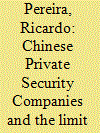

|
|
|
|
|
| Summary/Abstract |
This article analyses how China has overcome the limit of coercion through the use of Private Security Companies since the end of the Cold War until 2021. For this purpose, the Security Governance approach was applied to understand how the decentralisation and fragmentation of the security monopoly by the state could result in convenient coercive acts against societies. We point two paths of observation: an international path – the protection of the Chinese diaspora and the Belt and Road Initiative facilities; and a national path – the governmental interests that pave the monitoring and controlling mechanisms of Chinese society.
|
|
|
|
|
|
|
|
|
|
|
|
|
|
|
|
| 2 |
ID:
192662


|
|
|
|
|
| Summary/Abstract |
The aim of this study is to analyse the impact of the armed conflict in Colombia on the environment, and in particular, terrorist attacks on the oil infrastructure and the phenomenon of oil spills in river basins in the department of Norte de Santander. The study covers the last decade, from 2010 to 2019, and is focused on one of the most violent departments in Colombia, through which the country’s most important oil pipeline runs, connecting Caño Limón in Arauca and Coveñas in Sucre. Based on governmental and other reports, the papersituates these acts violence within within the wider dynamics ofarmed confllict. A model is also proposed pointing to the urgency of finding new variables and risk probability factors so that this threat to security in Colombia, currently as unpredictable as it is unresolved, may be effectively managed.
|
|
|
|
|
|
|
|
|
|
|
|
|
|
|
|
| 3 |
ID:
192661
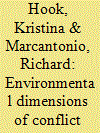

|
|
|
|
|
| Summary/Abstract |
Unique within the recent history of environmental hazards, eastern Ukraine illustrates the dangers arising from conflict in an urban landscape heavily modified by human action (including coal extraction and nuclear testing) and requiring active management. To analyze these dynamics and their implications, we examine industrialization in the Donbas region and warfare-accelerated environmental risks. Using primary data and ethnographic interviewing, we compare responses by state and international institutions tasked with monitoring and environmental redress in the context of larger mandates, noting widespread shortfall. This article contributes to emergent environment and warfare related literature by exploring how actors with divergent goals coalesce in downgrading environmental concerns, despite increasing risks, motivation to assist, and widening impact across country and continental divides. Significant for the study of small wars, a lack of international political will for ‘forgotten conflicts’ increases the likelihood of shared environmental risks being treated as simply another policy item to be negotiated. However, environmental disasters routinely cross international borders and pose long-lasting, compounding harm to direct, indirect, and even uninvolved parties. Furthermore, such dynamics may increasingly characterize warfare as urbanization and industrialization continue their global spread, with active war-time environmental management ushering in profound challenges and new areas of needed expertise.
|
|
|
|
|
|
|
|
|
|
|
|
|
|
|
|
| 4 |
ID:
192665
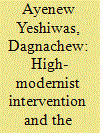

|
|
|
|
|
| Summary/Abstract |
This study explores the interface of the Grand Ethiopian Renaissance Dam (GERD), a high-modernist hydraulic scheme, with the protracted frontier conflict in Metekel Zone of Benishangul Gumuz Regional State. Without downplaying the national technocratic ambitions that it invokes, based on fieldwork conducted in 2022, the study witnessed as the dam’s presence in Metekel has escalated the perennial state-local skirmishes, rekindled inter-group hostilities, and ultimately trans-nationalized the frontier mayhem in the area. Such impacts of the dam were rooted in the state’s long-held frontier imagination and coercive relocation program through which hegemonic high-modernist narratives contested locals’ lived experiences. Differential local impacts of the dam, its role in mounting competing territorialities, and the concomitance of the trans-national feud with local discords were also equally influencing. However, the interface between the GERD and frontier struggles in Metekel was broadly shaped by the frontier’s history and national governance policies. In revealing so, the study provides insights that complement debates about frontier dynamics and struggles in Ethiopia and Africa, which tend to concentrate on tensions related to land transfer for private investors. Indeed, frontier struggles seem too complex: one must interrogate multiple actors, the complex history, and a broader range of issues with local, national, and regional dimensions.
|
|
|
|
|
|
|
|
|
|
|
|
|
|
|
|
| 5 |
ID:
192660
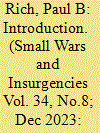

|
|
|
|
|
| Summary/Abstract |
This special issue contains five papers dealing with various aspects of climate change and its relationship to patterns of insurgency and terrorism. This is the first special issue in this journal on a topic that increasingly dominates the media and wider political discussion, though SWI has published some papers previously in this area, most notably one by Marina Malamud in 2018 that usefully categorised climate-change conflicts into four types: 1) those linked to the environment into resource-based conflict; 2) a warfare ecology paradigm referring to non-premeditated change to the environment as a result of military conflict; 3) warfare in which the environment was the target and 4) an insurgency-conflict intersection in which climate change increased the likelihood and frequency of war and conflict.Footnote1 These four categories have helped inform the approach taken in this introduction, especially the last relating to the probable impact of global climate change on insurgencies.
|
|
|
|
|
|
|
|
|
|
|
|
|
|
|
|
| 6 |
ID:
192663


|
|
|
|
|
| Summary/Abstract |
The Multinational Joint Task Force (MNJTF), comprising soldiers from the Lake Chad Basin countries (Cameroon, Chad, Niger, Nigeria, and Benin), has been countering insurgency in the region since 2015. Frictional relationships resulting from mutual distrust affected the commitments of MNJTF contributing countries in counterinsurgency operations in Lake Chad. Chad, notably, considered itself an arrowhead in the counterinsurgency due to the laxity of other coalition countries. The devastation its soldiers suffered and the waxing strength of the operation of Boko Haram and allied groups in the region motivated the late Chadian President Idriss Déby to declare in December 2019 the exiting of his soldiers from the MNJTF to concentrate on protecting the borders of the country. The study relied on extant literature and explorative qualitative techniques to investigate the consequences of such exit on northeast Nigeria. At the very least, it reveals that Chad’s exit betrayed the MNJTF counterinsurgency coalition and has negative consequences for the security complexity in northeast Nigeria.
|
|
|
|
|
|
|
|
|
|
|
|
|
|
|
|
| 7 |
ID:
192664
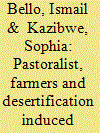

|
|
|
|
|
| Summary/Abstract |
Desertification-induced conflict involving pastoralists and farmers is primarily driven by competition for water, forage, and land, other factors like ethnicity and religion also come into play. This paper utilizes descriptive analysis and secondary data, adopting the Economic & Migration Theory to explain the issue in the southern frontiers. Findings from the paper show that in the southward frontiers, the conflict has taken a different dimension due to differences in culture and religion. The migration from the core north which has been ravaged by desertification to the south has increased confrontation between these groups.
|
|
|
|
|
|
|
|
|
|
|
|
|
|
|
|
|
|
|
|
|